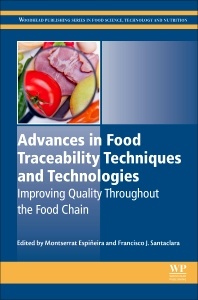Advances in Food Traceability Techniques and Technologies Improving Quality Throughout the Food Chain Woodhead Publishing Series in Food Science, Technology and Nutrition Series
Coordonnateurs : Espiñeira Montserrat, Santaclara Francisco J

Advances in Food Traceability Techniques and Technologies: Improving Quality Throughout the Food Chain covers in detail a topic of great importance to both the food industry which is obliged to provide clear and accurate labeling of their products and the government and other organizations which are tasked with verification of claims of food quality and safety.
The traceability of food products is becoming ever more important as globalization continues to increase the complexity of food chains. Coverage in the book includes the wide range of technologies and techniques which have been utilized in the tracing of food products. In addition, the ways in which the misuse of food traceability will affect the quality of food is also covered throughout.
The first part of the book introduces the concept of traceability in the food industry, highlighting advantages of a robust traceability and the difficulties involved in implementing them. The second part looks at the technologies used to trace products, and the third section reviews the legal requirements for food traceability in the EU, the US, and the rest of the world.
The final section contains a number of case studies which evaluate how food traceability has been successfully implemented in various foods focusing on the quality of the food.
1. What Is Food Traceability? 2. Defining and Analyzing Traceability Systems in Food Supply Chains 3. Problems and Implementation Hurdles in Food Traceability 4. Alphanumerical and Optical Coding Systems for Food Traceability 5. Radio-Frequency Identification Usage in Food Traceability 6. The Use of Molecular Biology Techniques in Food Traceability 7. Near Infrared Spectroscopy and Food Authenticity 8. The Use of ICP-MS in Food Traceability 9. Future Technology in Tracing Animals on the Food Chain 10. Traceability Software for the Food Industry 11. Real-Time Tracking and Remote Monitoring in Food Traceability 12. Legal Requirements for Food Traceability in the European Union 13. Legal Requirements and Regulation for Food Traceability in the United States 14. Effective Use of Food Traceability in Product Recall 15. Analytical Approaches for the Evaluation of Food Protected Designation of Origin 16. Effective Use of Food Traceability in Cereal Grain Food Supply Chains 17. Effective Use of Food Traceability in Meat Supply Chains 18. A Closed-Loop Traceability System to Improve Logistics Decisions in Food Supply Chains: A Case Study on Dairy Products 19. Effective Use of Food Traceability in Animal Feed
Francisco J. Santaclara studied Biological Sciences in the Vigo University in 1998-2002. In 2008 he obtained the PhD in the same university. His research works are focused in fish and land animal species identification, pathogen identification and detection, allergens, all of them using molecular techniques based on DNA study.
He worked in the National Association of Sea and Fish Canned Food Producers- National Technical Center for Fishing Products) in the period 2003-2008, where he was the person in charge of the Molecular Biology and Biotechnology Unit. In the period 2010-2013 worked as researcher in the Food Biochemistry Group of the Institute of Marine Research belonging to the Spanish National Research Council.
- Provides a wide ranging overview of all recent advances in food traceability techniques and technologies
- Presents case studies covering when food traceability techniques have been applied to a range of food stuffs
- Covers the legal aspects of food traceability in the EU, the USA, and around the world
Date de parution : 06-2016
Ouvrage de 402 p.
15x22.8 cm
Thèmes d’Advances in Food Traceability Techniques and Technologies :
Mots-clés :
Animal species; Animal tracing; Authentication; Auto-ID; Auto-identification technology; Automatic identification; Batch dispersion; Biometric identifier; Boron; Breadth; Cereal grain; Cereal; Cheese; Chemometrics; Cold chain; Consistency; Consumers; Dairy products; ddPCR; Depth; Directives; Discrimination; DNA; EU food law; Ex-post monitoring; Fish; FIspace; Flow models; Food safety; Food supply chain; Food traceability; Food; General food law; Genetic fingerprinting; Genetically modified plant; Geographical indications; Geographical origin; Granularity; Heavy elements; Honey; ICP-MS; Implementation; Indicator; Information technology; Infrared spectroscopy (IR)IRMS; Internet of things; Isotope analysis; Laws; Lead; Liability; Logistics; Mapping; Meat; Mineral profile; Molecular biology; Molecular diagnostic; Motivation; Multielement profiling; Multielement; Near infrared; Nuclear magnetic resonance (NMR)Olive oil; Ontology; Optical code; Organic compounds; Packaging; Precision; Process diagrams; Product history; Product identification; Product recall; Protected designation of origin; qPCR; Quality verification; Quality; Radio frequency identification (RFID)Traceability; Real-time monitoring; Recall size; Refrigerated transport; Regulation; Regulations; RFID; Risk management; Risk; Root cause; Safety; Sensor; Strontium; Supply chain; Tag; Trace elements; Traceability legislation; Traceability principles; Traceability software; Traceability; Tracing; Track-and-trace; Tracking; Ultra-trace elements; Wine; Wireless sensing; WSN



